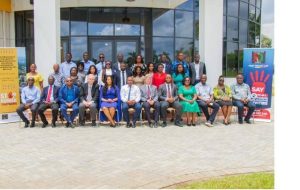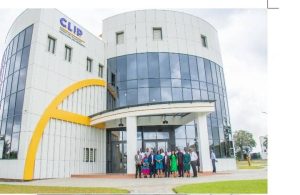|
Getting your Trinity Audio player ready...
|
On the 12th of August, Ensign Global College in collaboration with Engage Now Africa organized a two-day conference at Kpong.

The theme of the conference was “The Public health challenge of human trafficking- prevention, intervention, reintegration, and Recovery”. Mr. Afasi, the director of Engage Now Africa and a member of the Commonwealth 8.7 management committee responsible for Africa gave the keynote address. He deepened the understanding of the holistic approach to stopping human trafficking and other forms of exploitation.
Since 1981, African countries have joined global efforts to combat human trafficking by ratifying the African Charter on Human and Peoples’ Rights (ACHPR) instruments. This Charter prohibits slavery and human trafficking (Thipanyane, 2015).

According to him, the Contributing factors of modern slavery include socio-economic and cultural practices that fuel human trafficking.
Impact of socio-economic factors, including growing poverty, joblessness, inequality, gender-based violence, social exclusion, war, and displacement that may result from natural disasters.
The current global economic crisis and the increasing poverty caused by massive unemployment are likely to lead to an increase in trafficking for exploitative labor.
It is often difficult financial circumstances that make people consider the option of migration and it is also poverty that makes them vulnerable to becoming easy targets for traffickers.
According to the UNODC, sending a child away to work is commonly accepted in places in West Africa. It’s much easier to exploit children in these environments.
In addition, Mr. Afasi added that the misconception and abuse of African cultures are among several factors that contribute to Human Trafficking in Africa (Thipanyane, 2015).
Culture is socially constructed and as such, it does not exist independently of the people who construct it.
Perhaps, people create and define their culture based on society’s needs.All African communities have certain practices that reflect their values and beliefs.
These practices reflect both positive and negative aspects of the traditional culture of those communities.
The positive aspects are always beneficial to all the members of those communities.
Africans have many positive cultural values such as solidarity, tolerance, respect for elders, caring for the needy, and sharing, (Idang, 2015).
However, there are also traditional practices in Africa that are harmful to certain groups in the communities, such as women and children.
It is widely acknowledged that in nearly every country in Africa, some women are subjected to second-class citizen status.
The President and the Dean of Ensign Global College also emphasized the four P’s Prevention, Protection, Prosecution, and Partnership.
He acknowledged the existing four pillars and he also introduced the Public Health approach to combat Human Trafficking and other forms of exploitation. During his presentation, he acknowledged the existing framework in the country and he suggested that by using the public health approach we will be able to stop human trafficking at the source, transit, and destination communities or countries.
Institutions that participated at the conference were Engage Now Africa, The Ghana Police Service- Anti-Human Trafficking Unit, Headquarters, The Ghana Immigration Service- Headquarters, Economic and Organized Crime Office Headquarters, The International Cocoa Initiative, The Attorney General Department and other health professionals. During the meeting, it was acknowledged by all participants to embrace the public health approach to combat human trafficking. Participants also suggested that public health professionals should be introduced to human trafficking as a core subject since most of them are frontline officers, others also proposed it should be an elective subject so that those who would love to specialize in that field could do so.
The country director of Engage Now Africa, Madame Cecilia Amankwah also shared some of the skills training Engage Now Africa has been providing in the country to avoid people becoming vulnerable to Human Trafficking and other forms of exploitation. Mr. Ayarigah, the head of the anti-human trafficking unit headquarters, and Madam Alberta, the Head of Anti-Smuggling and Trafficking in Persons Unit took turns to explain how the police have been collaborating with Engage Now Africa to combat Human Trafficking and related issues.
Mr. Dominic, the head of the Anti-Human Trafficking Unit, Economic and Organized Crime Office, also embraced the public health approach to combat human trafficking, he stressed on collaboration between Ensign Global College with state institutions mandated by law to work hand in hand since they are going to use some of the primary data or information on Human Trafficking casesMr Andrew, a senior attorney from the Attorney General Department, during his presentation stressed on the efforts of the Attorney General department to prosecute perpetrators of human trafficking.
During the panel discussion, Mr. Mike Arthur also suggested that we should invite more non-profit organizations including the Ministry of Gender, Children and Social Protection, the human trafficking secretariat to participate in any conferences of such.
He deliberated on the differences between child labor and human trafficking.In conclusion, Mr. Afasi gave the concluding remarks.
He explained that, “addressing this critical issue requires multiple approaches and collective efforts.
The private sector can play an important role in the elimination of human trafficking in Africa, in addition, partners and stakeholders from government institutions, academia and development agencies and the members of civil society organizations must concentrate their effort on collecting relevant data and implementing interventions that tackle the root cause of human trafficking in Africa”He suggested the need for strengthening institutional mechanisms as a preventive measure to crack down the phenomenon of human trafficking.
He also recommended that, Firstly, the government should continue sensitization on Human Trafficking and other forms of exploitation since the majority of the people do not understand what is Human Trafficking, the effects and the economic implications of Human Trafficking.
Secondly, they should break the silence on harmful cultural practices.
They should warn the public to not trust people to take their children to urban areas without being sure what activity or job they will be involved in.
They should be careful who recruits them for a job in Ghana or abroad in order to avoid being subjected to bad working conditions, sexual exploitation and labor exploitation.